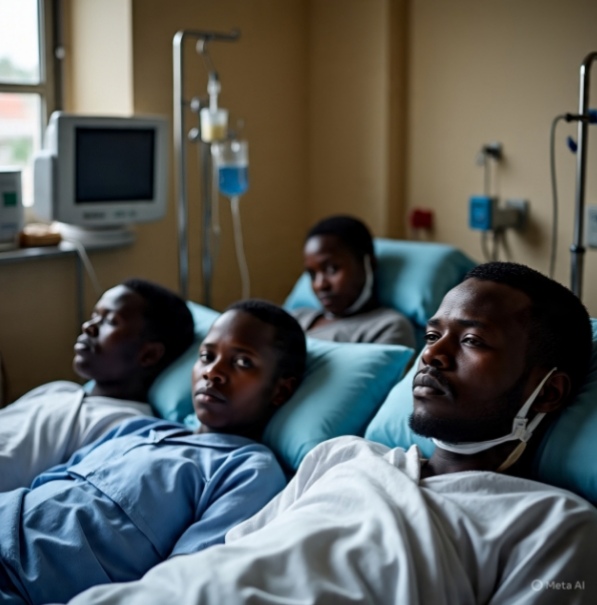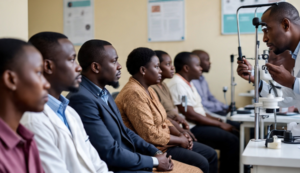Umuaka may battle the scourge of HIV-AIDS soon.
5 min read
Umuaka town, the heartbeat of Orlu Senatorial Zone and the giant of Njaba LGA is a vibrant and “fun-infested” community unaware of the silent threat of HIV-AIDS lurking in the shadows for her. The silent threat which is the aggressive invasion of Imo State by the dreaded HIV-AIDS has reached an alarming rate. It can be recalled that Umuaka Times and other media outfits a couple of months ago reported that the prevalence of HIV-AIDS in Imo State has surprisingly become a complex emergency where over 70,000 people are said to be living with the disease. Umuaka Times deems it fit to revisit the threat posed by the scourge once again as people still engage in risky behaviours.

Unfortunately, Umuaka Times local affairs correspondents could not establish the exact number of people living with HIV/AIDS across local government areas in the state, but the only available data on the scourge leaves no room for cheers. Sadly enough, there is also no data to know the number of people with HIV-AIDS in Umuaka town. Statewide statistics gathered by Umuaka Times claims that 73,000 Imolites are living with HIV/AIDS and the number is on the increase. For example and precisely in 2019, about 3,891 people tested positive for HIV in the state out of 133,792 individuals screened. This shows that the state then had a provenance rate of 1.8%, which is higher than the national prevalence rate of 1.4%. As at today, the figure has tripled.
A study carried out in Owerri West Local Government Area reported that an 8.1% prevalence rate among 17,964 individuals who underwent HIV counseling and testing between 2007 and 2009. This is a highly disturbing figure. The question in every concerned fellow in the state now is, who knows what the rate could be in today’s reckless and risky behavioural world?
Another question now is how safe is Umuaka town in the crisis of HIV-AIDS that has enveloped the state with highly intimidating figures? Of all the hotels in Owerri, young Akalites are said to be regular visitors to such hotels where they seek fun and relaxation. A good number of them both males and females seriously and unrepentantly engages in sexually risky behaviour. Umuaka town is just about 20 minutes’ drive to Owerri where the “action films” take place in several hotels. There is a high possibility that out of 73,000 people living with HIV-AIDS in the state, the risk of more infections precariously hangs on the shoulders of Akalites and other residents in the community. Reasons being that the bustling markets, hotel “action films” and lively gatherings in Umuaka mask the potential dangers of unprotected interactions. Unaware of their status, it is generally believed that some individual Akalites might be living with HIV, putting others at risk because the stigma surrounding the disease makes it difficult for people to get tested or seek treatment.
Lack of awareness and education about HIV/AIDS is another gallop that leaves Umuaka youths vulnerable to the spread of the disease as many might not know the importance of using protection or getting tested regularly. The consequences of inaction could be devastating, with more people in the community potentially getting infected.
Meanwhile all hope is not lost; there have been significant advancements made in the fight against HIV/AIDS globally. Some notable developments are large. Perhaps there is a hopeful dimension to this for Akalites; Umuaka Times can confirm that if Akalites come together to learn about HIV/AIDS, get tested and practice safe habits, they can reduce the risk of infections in the community. Community stakeholders, healthcare workers and local organizations can join forces to spread awareness and provide support.
A medical doctor who spoke with Umuaka Times on the condition of anonymity advised Akalites saying, “By working together, Umuaka can face the challenge head-on and protect its people from the threat of HIV/AIDS. The town’s strong sense of community can be its greatest strength in this fight. With education, awareness, and collective action, Umuaka can safeguard its residents’ health and well-being.”
For those who harbour the fear of hearing the bad news about their HIV status, there is hope and the hope is really strong. There have been some good and highly commendable improvements for those living with the virus. Under treatment and prevention approach, it is a well-known fact that Antiretroviral Therapy (ART) has transformed HIV into a manageable chronic condition, reducing viral loads to undetectable levels and preventing transmissions. Akalites can also benefit from this medical exercise. In the cause of the research of this story, Umuaka Times also came across what is called Long-acting Injectables LAI: This is a process designed to replace daily pills, improving adherence to treatment plans and reducing the burden of remembering daily medication.
There is also what is called Gene-editing Technologies, CRISPR and other gene-editing tools aimed to eliminate HIV while preserving safety, potentially leading to a cure. Latency-reversing Agents are also another set of tools which helps to flush out the virus from its reservoirs within the body where it hides during standard ART treatment.
So far, there have been preventions and breakthroughs worldwide; Pre-exposure Prophylaxis popularly known as PrEP has been shown to be effective in preventing HIV transmission. There is also Twice-Yearly Injectable Drug: For example, there is Lenacapavir, a new injectable drug administered twice a year. This drug has been recommended by the World Health Organization for HIV prevention, offering a more convenient and discreet alternative to daily medication.
Broadly Neutralizing Antibodies also fall into this group but recent reports Umuaka Times came across says that researchers are studying the potential of these antibodies to both treat and prevent HIV, targeting specific parts of the virus to block its ability to infect human cells.
In technology, there are also some successful advancements; Artificial Intelligence (AI) is being used to improve client outcomes, predict and prevent treatment interruptions and enhance retention in care. There is also what is called Machine Learning: Machine learning algorithms can correctly classify risk of non-adherence and viral suppression, helping healthcare systems target high-risk populations.
Finally telemedicine and digital health platforms are expanding access to HIV care and treatment, particularly in resource-constrained settings. Akalites can as well access any of the above free medical or subsidized exercises and save themselves from the dreaded HIV-AIDS. HIV-AIDS is no longer a death sentence, it is treatable and manageable.
Umuaka may battle the scourge of HIV-AIDS soon if proper care is not taken and if people do not change their risky behaviours.




